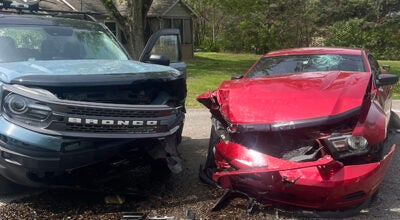COA releasing guidebooks to help caregivers for dementia patients
Published 8:00 am Friday, October 23, 2015

Cass County COA CEO Bob Cochrane talks about a new booklet designed to help caregivers of dementia patients during the Dowagiac Rotary Club meeting Thursday. (Leader photo/TED YOAKUM)
Perhaps there’s no greater fear for a loved one or caregiver of someone with dementia than discovering the person under his or her care has vanished.
Sadly, this fear is an all too real reality for many caregivers, as around 60 percent individuals diagnosed with dementia wander off, become disoriented or get lost, according to Cass County COA CEO Bob Cochrane.
Worst yet, many of those who wander away from care may never find their way back home.
“If we don’t find them within 24 hours, up to half of those lost suffer some sort of injury or even death,” Cochrane said. “So finding them quickly is pretty critical.”
To help prevent these tragedies from occurring here in Cass County, the COA is offering a new “Caregiver’s Guide to Wandering” booklet.
The publication provides critical information and tools to help support caregivers prevent their wards from wandering off, and, in the case they do walk away, provides resources that can help bring them back to safety.
Cochrane showed off the new booklet to his fellow members of the Dowagiac Rotary Club Thursday afternoon, during their weekly meeting at the Elks Lodge. The CEO of the aging support organization and Rotary treasurer was invited to serve as the program for the club meeting by former Dowagiac Union Schools Superintendent Larry Crandall.
While every case is different, there are a number of common motivations for dementia patients to wander off on their own. In many cases, it’s because of restlessness or lack of stimulation or exercise; other times, it may caused by delusions, Cochrane said.
“This can cause people to believe they have to go to work, or that they have some other obligation to fulfill,” he said. “So they’ll take off to go to work or go to a meeting or whatever it may be they believe is on their schedule and they need to take care of.”
In most cases, people who wander off are found within 1.5-mile radius from their home — therefore, it’s useful for caregivers to reach out to neighbors ahead of time to let them know to contact them in case they notice a dementia patient wandering alone in the neighborhood, Cochrane said.
Other ways of preventing wandering include deadbolting doors (placing the locks in unusual locations) and by hiding car keys. Caregivers should also considering giving their loved ones a medical bracelet or even electronic tracking devices.
The COA booklet also has a few pages that caregivers can fill out and give to police in the event the person in their care goes missing. This includes basic information, a place for a photo, fingerprints and even fingernail or toenail clippings that can be used for DNA analysis.
“We hope we don’t need it, but in case that we do, here it is,” Cochrane said about the booklet.






